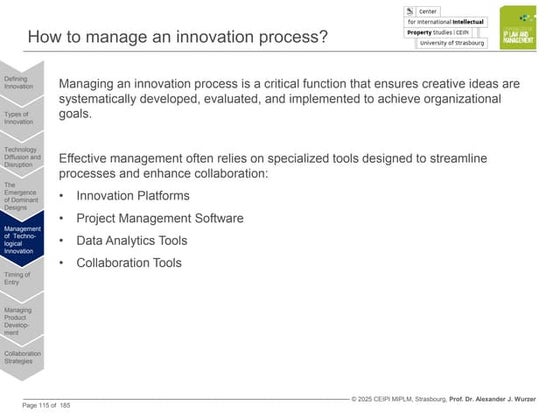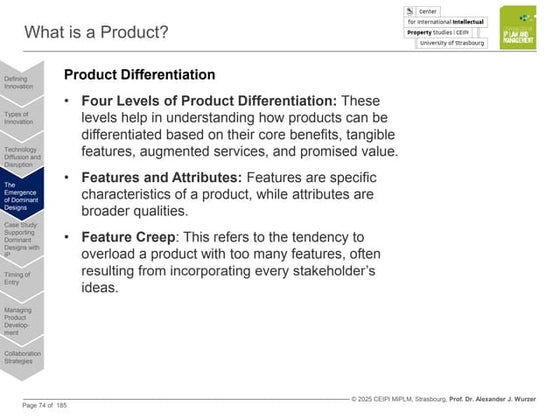Forgetting and theories of forgetting
Download as PPTX, PDF35 likes36,450 views
Forgetting occurs when previously stored information cannot be retrieved. There are several theories for why forgetting occurs, including decay theory, interference theory, and retrieval failure theory. Decay theory proposes that memories fade over time as the memory traces in the brain weaken without reinforcement. Interference theory suggests that new learning can interfere with retrieving older memories. Retrieval failure theory posits that forgetting is due to an inability to access stored information using the appropriate retrieval cues, rather than the information actually being lost.
1 of 21
Downloaded 719 times
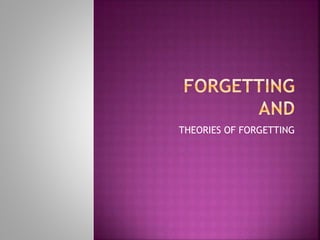


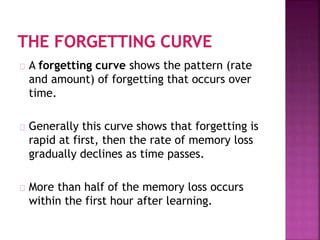
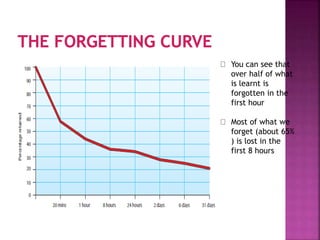

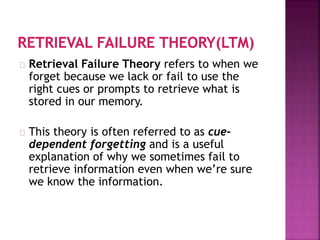
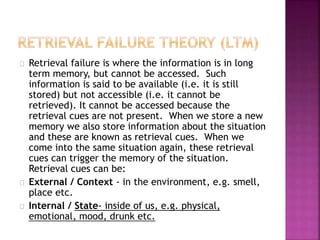





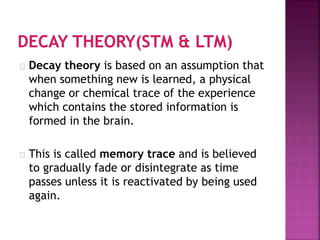

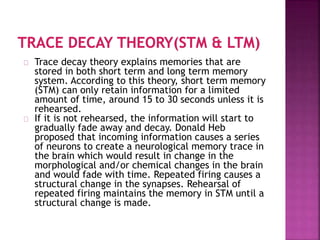
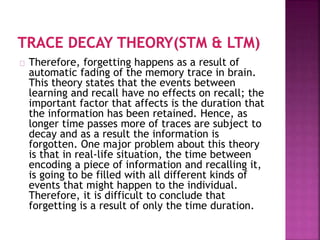
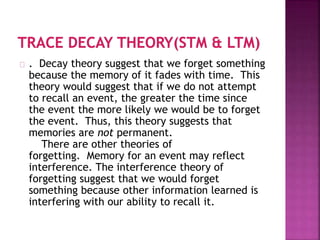
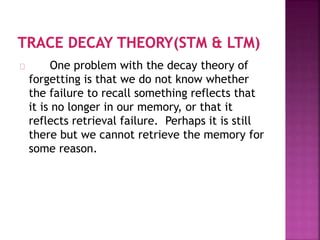

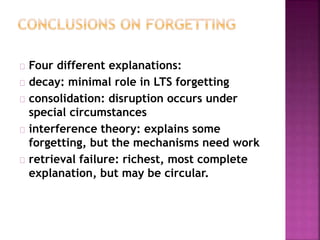
Recommended
Theories of forgetting



Theories of forgettingNIMHANS
Ìý
The document discusses several theories of forgetting. It defines different types of forgetting such as natural forgetting, morbid forgetting, general forgetting, and specific forgetting. It also outlines some key theories of why forgetting takes place, including trace decay theory, displacement in short-term memory, encoding failure, interference and retrieval failure in long-term memory, and motivated forgetting through suppression and repression.Study of memory in psychology



Study of memory in psychologyAbdo_452
Ìý
The document summarizes key aspects of memory from a psychological perspective. It discusses how memory involves encoding, storing, and retrieving information over time. There are three main types of encoding - visual, acoustic, and semantic. Short term memory has limited capacity and duration, while long term memory has unlimited capacity and duration. A multi-store model of memory describes how information flows from sensory memory to short term memory to long term memory through encoding and rehearsal. More recent models like working memory divide short term memory into separate systems for visual-spatial and phonological information, controlled by a central executive.Memory and its types and Causes of Forgetting - PPT



Memory and its types and Causes of Forgetting - PPTArun Joseph
Ìý
This document discusses memory and forgetting. It defines memory as the process of storing and recalling experiences and information over time. Several components are involved, including learning, retention, recall/retrieval, and recognition. Factors that influence memory include motivation, attention, repetition, meaningfulness of material, and using multiple senses. The document also discusses different types of memory like short term, long term, habit, and episodic memory. Causes of normal forgetting include disuse, interference, inadequate learning, lack of interest, while abnormal forgetting may result from injury or trauma. Strategies to address forgetting include understanding students, using memory techniques, and creating a supportive learning environment.Forgetting- Definition , Types of Forgetting, Theories of Forgetting, Ebbingh...



Forgetting- Definition , Types of Forgetting, Theories of Forgetting, Ebbingh...Suresh Babu
Ìý
Forgetting- Definition , Types of Forgetting, Theories of Forgetting, Ebbinghaus forgetting curve Causes of ForgettingForgetting



Forgettingshyamilitv
Ìý
Forgetting is the apparent loss of previously learned information from long-term memory over time. There are several causes of forgetting, including faulty memory processes, lack of interest or motivation, interference from other information, and physical damage. Two major theories of forgetting are trace decay theory, which states that memory traces fade without use over long periods, and interference theory, which posits that new learning can inhibit recall of older information. Techniques to improve memorization include repeated recitation, overlearning, spaced practice, selection, review, mnemonics, organization, and sleep.Memory theories



Memory theoriesRavi Soni
Ìý
Memory involves three main processes: encoding, storage, and retrieval. Encoding involves receiving input and transforming it into a code. Storage involves putting the encoded information into memory. Retrieval involves accessing stored information when needed. There are two main theories of memory formation: the information processing theory and the level of processing theory. The information processing theory views memory as operating similar to a computer, with information passing through sensory registers, short term memory, and long term memory. The level of processing theory suggests that deeper analysis and encoding of information at the semantic or meaning level leads to better memory compared to more shallow processing.interference theory of forgetting 



interference theory of forgetting Ankita Manwani
Ìý
There are two main theories of forgetting discussed in the document: interference theory and retrieval failure theory. Interference theory posits that forgetting occurs because new memories can interfere with older memories stored in long-term memory. There are two types of interference: proactive interference, which occurs when old memories interfere with recall of new information, and retroactive interference, which occurs when new memories interfere with recall of old memories. Examples of both types of interference are provided.Human Memory (Psychology)



Human Memory (Psychology)Shara Mae Reloj
Ìý
Sensory memory briefly stores perceptions and passes them to short-term memory. Short-term memory stores recently acquired information through working memory. Long-term memory securely stores information for long periods through explicit (declarative) memory of facts and episodic memory of experiences, and implicit (procedural) memory of skills. The three processes of memory are encoding, which converts information into a storable form; storage, where information resides in the brain over time; and retrieval, where the brain recalls previously learned information.Memory



MemoryHarve Abella
Ìý
The document discusses several topics related to memory, including:
1. Memory is selective and reconstructive rather than like a videotape, as recall involves filling gaps with inferences that are sometimes unaware.
2. Confabulation occurs when people confuse events that happened to someone else or events that never occurred with their own memories. It is more likely under certain conditions.
3. Studies found that young children can be led to make false claims of events through suggestive questioning techniques.
4. Hypnosis is not considered reliable for courtroom testimony due to high rates of errors and false memories it can induce.
5. The three-box model of memory describes sensory memory, short-term memory,Psychology:Theories of Intelligence



Psychology:Theories of IntelligenceSt Mary's College,Thrissur,Kerala
Ìý
The document discusses 12 major theories of intelligence:
1. Faculty theory which views intelligence as consisting of independent mental faculties.
2. One factor theory which reduces all abilities to a single general intelligence factor.
3. Spearman's two-factor theory comprising a general intelligence ("g") factor and specific factors.
4. Thorndike's multifactor theory which identified four attributes of intelligence.
5. Thurstone's primary mental abilities theory identifying six primary factors.
6. Guilford's structure of intellect model classifying intellectual tasks.
7. Vernon's hierarchical theory describing intelligence at varying levels of generality.
8. Cattell's fluid and crystallized theory distinguishing two typesMemory



MemoryDr.Senthilnayaki Ramasubbu
Ìý
Memory plays an important role in learning and development. There are three main types of memory: sensory memory, short-term memory, and long-term memory. Sensory memory only lasts 1 second, short-term memory lasts 20-30 seconds through chunking information, and long-term memory can store information indefinitely. Memory involves encoding, storing, and retrieving information. It is influenced by both intrinsic factors like age and extrinsic factors like environment. There are several theories that attempt to explain memory and forgetting, including memory trace theory, levels of processing theory, and interference theory.Memory



MemoryVIKRANT KULTHE
Ìý
the memory is the power of Human being. what is memory and its orientation is given in this presentation.Memory



MemoryMuddsar Siddiqui
Ìý
Memory involves the retention and recall of information and experiences. The hippocampus, amygdala, and cerebral cortex play key roles in memory processing and storage. There are different types of memory including short-term memory, long-term memory, sensory memory, declarative memory, and procedural memory. Methods for improving memory include recall, recognition, relearning, brain exercises, managing stress, good sleep, and not smoking. Aging can impact memory through changes in the hippocampus and loss of neurons and brain function over time. Forgetting and amnesia can result from brain damage or injury.psychology of memory



psychology of memoryehab elbaz
Ìý
Memory works through encoding, storage, and retrieval according to an information processing model. The Atkinson-Shiffrin model proposes that information moves from sensory memory to short-term memory and then long-term memory, though more recent models recognize additional processing in working memory and some automatic processing into long-term memory. Memories can be formed through effortful, explicit processing or implicit, automatic processing. Encoding involves strategies like chunking, mnemonics, rehearsal, deep processing, and relating information to oneself. Memories are stored throughout the brain in overlapping neural networks rather than isolated locations. Explicit and implicit memories are processed in different brain areas, and emotions can strengthen memory formation through the amygdala. Retrieval is affectedUnit 3 thinking



Unit 3 thinkingJohny Kutty Joseph
Ìý
The document discusses various aspects of thinking including its definition, nature, types, levels of development, and factors that can alter thinking. Some key points:
- Thinking is a cognitive process involving mental activities like perception, imagination, and recollection. It is goal-directed but not directly observable.
- There are different types of thinking including perceptual, abstract, convergent, divergent, reflective, and critical thinking.
- Piaget's stages of cognitive development include sensory-motor, preoperational, concrete operational, and formal operational periods. Language and communication are important for thinking.
- Factors like emotions, suggestions, superstitions, and improper defense mechanisms can irrationally alter or impairMemory and Types - Psychology



Memory and Types - PsychologyMHassaanMasood
Ìý
This document provides an overview of human memory. It defines memory as the mental capacity to store, recall, or recognize past experiences. It describes the main components of memory according to cognitive psychologists as the mental system that receives, encodes, stores, modifies, or retrieves information. It also outlines the main types of human memory, including sensory memory, short-term memory, and long-term memory. Finally, it compares human memory to computer memory and describes the different types of computer memory, such as RAM and ROM.Perception in Psychology



Perception in PsychologyEhtesham Mehmood
Ìý
Sensation is the detection of sensory stimuli by the senses, while perception is the interpretation of sensory information. The eyes, ears, skin, nose, and tongue contain receptor cells that receive stimuli and transmit it as neural impulses to the brain. Perceptual processes like selection, organization, and interpretation occur in the brain. Both objective factors like intensity, size, and movement and subjective factors like motives, experiences, and culture influence our perceptions.Theory of forgetting



Theory of forgettingjeniferdivya
Ìý
This document discusses several theories of forgetting, including:
1. Decay theory proposes that memories fade over time due to lack of use or rehearsal.
2. Interference theory suggests that new learning can disrupt old memories through proactive and retroactive interference.
3. Retrieval failure theory argues that forgetting occurs when memories are still stored but cannot be accessed or retrieved due to the absence of appropriate retrieval cues. Contextual cues are important for successful memory retrieval.Stages of memory encoding storage and retrieval



Stages of memory encoding storage and retrievalCol Mukteshwar Prasad
Ìý
Memory involves three main stages: encoding, storage, and retrieval. Information is encoded using visual, acoustic, or semantic representations when it enters the memory system. It is then stored either in short-term memory (for up to 30 seconds) or long-term memory (which can last a lifetime). Retrieval involves accessing stored information through sequential ordering for short-term memory or associations for long-term memory. Many memory experiments are criticized for having low ecological validity since the laboratory setting and tasks like recalling word lists are artificial compared to real-world memory use.Attention



AttentionMaria Angela Leabres-Diopol
Ìý
This document discusses theories of attention from both historical and modern cognitive perspectives. It defines attention as the selection of certain stimuli for further processing while ignoring others. Early theories proposed filters that occurred early or late in processing to explain selective attention effects. Later, capacity theories viewed attention as a limited mental resource. Divided attention experiments found that tasks drawing from different resources could be performed concurrently better than those using the same resources. Visual attention research identified neurons responding selectively to features and the role of the thalamus in controlling receptive fields. Executive attention involves inhibiting inappropriate responses under demanding conditions. Feature integration theory proposed that attention is needed to bind distributed features into whole object perceptions.Theories of emotion



Theories of emotionEnoch R G
Ìý
Emotion is a complex phenomenon influenced by physiological and cognitive factors. It arises from both physical reactions in the body as well as conscious experiences. The document discusses several theories of emotion:
1. James-Lange theory proposes that emotional experience arises from physiological arousal.
2. Cannon-Bard theory argues that physiological and emotional experiences occur simultaneously rather than one causing the other.
3. Schachter-Singer theory suggests emotion results from physiological arousal combined with cognitive interpretation of the arousal.
4. Cognitive theories like Lazarus' emphasize that appraisal and evaluation of situations determine emotional responses.
No single theory comprehensively explains emotions, but most agree both biological and environmental factors interact toMemory and forgetting



Memory and forgettingAni Vadakke Purayil Kannur
Ìý
Memory involves encoding, storing, and retrieving information. It has three main stages - encoding where information enters the brain, storage where it is held, and retrieval where it is recalled. There are three types of memory - sensory which holds information briefly, short-term which lasts around 30 seconds, and long-term which can hold memories indefinitely. Factors like attention, motivation, methods of learning, and testing influence how well information is remembered.1. Atkinson- Shiffrin model of memory



1. Atkinson- Shiffrin model of memoryBrianna
Ìý
The Atkinson-Shiffrin Model proposes that human memory consists of three stores: sensory memory, short-term memory, and long-term memory. Sensory memory briefly stores sensory information through iconic, echoic, and haptic memory. Short-term memory then stores about 7 chunks of information that can be rehearsed for around 18-20 seconds. Long-term memory permanently stores meaningful information through elaborative rehearsal and associations with existing knowledge.Memory



MemoryCMoondog
Ìý
This document discusses different types of memory including short-term memory, long-term memory, procedural memory, priming memory, episodic memory, and semantic memory. It describes key aspects of memory such as encoding, storage, and retrieval. Different causes of memory loss are also outlined including alcohol blackout, dissociative fugue, Korsakoff's psychosis, post-traumatic amnesia, and repressed memory.Forgetting



ForgettingAakanksha Bajpai
Ìý
forgetfulness is very common these days. the causes can be either organic or psychological. there are numerous psychological theories behind it. The presentation will also stress upon the types of forgetting. As a remedial measure their are manyy ways by which memory power can be boosed up.Memory ,factors affecting the Memory ,and the types of memories



Memory ,factors affecting the Memory ,and the types of memoriesAlifBay
Ìý
shahzadhaider2392@gmail.com
contact us for more educational ppts, psychology, memory
A research Proposal by university of okara studentsCognition



CognitionHadeyaQ
Ìý
what is cognition? detailed lecture for medical/ health care students. (nurses, medical doctors, physical therapists, dentists, orthotics and prosthetics)Long term memory



Long term memorysidra tauseef
Ìý
memory
and one of the type of a memory is long term memory
further details are in the presentation.
how long term memory worksForgetting 



Forgetting Col Mukteshwar Prasad
Ìý
This document discusses strategies for combating forgetting and improving long-term memory retention of learned information. It recommends regularly reinforcing training to reduce the forgetting curve decline rate, improving clarity of information presentation, making content more relevant, and adding interactivity to maintain engagement. Spaced repetition and testing recall can strengthen memories over time.04. MEMORY - Its basic components, types



04. MEMORY - Its basic components, typesAbdulMannanChattha1
Ìý
Neurobiology of memory. Its types and disorders.More Related Content
What's hot (20)
Memory



MemoryHarve Abella
Ìý
The document discusses several topics related to memory, including:
1. Memory is selective and reconstructive rather than like a videotape, as recall involves filling gaps with inferences that are sometimes unaware.
2. Confabulation occurs when people confuse events that happened to someone else or events that never occurred with their own memories. It is more likely under certain conditions.
3. Studies found that young children can be led to make false claims of events through suggestive questioning techniques.
4. Hypnosis is not considered reliable for courtroom testimony due to high rates of errors and false memories it can induce.
5. The three-box model of memory describes sensory memory, short-term memory,Psychology:Theories of Intelligence



Psychology:Theories of IntelligenceSt Mary's College,Thrissur,Kerala
Ìý
The document discusses 12 major theories of intelligence:
1. Faculty theory which views intelligence as consisting of independent mental faculties.
2. One factor theory which reduces all abilities to a single general intelligence factor.
3. Spearman's two-factor theory comprising a general intelligence ("g") factor and specific factors.
4. Thorndike's multifactor theory which identified four attributes of intelligence.
5. Thurstone's primary mental abilities theory identifying six primary factors.
6. Guilford's structure of intellect model classifying intellectual tasks.
7. Vernon's hierarchical theory describing intelligence at varying levels of generality.
8. Cattell's fluid and crystallized theory distinguishing two typesMemory



MemoryDr.Senthilnayaki Ramasubbu
Ìý
Memory plays an important role in learning and development. There are three main types of memory: sensory memory, short-term memory, and long-term memory. Sensory memory only lasts 1 second, short-term memory lasts 20-30 seconds through chunking information, and long-term memory can store information indefinitely. Memory involves encoding, storing, and retrieving information. It is influenced by both intrinsic factors like age and extrinsic factors like environment. There are several theories that attempt to explain memory and forgetting, including memory trace theory, levels of processing theory, and interference theory.Memory



MemoryVIKRANT KULTHE
Ìý
the memory is the power of Human being. what is memory and its orientation is given in this presentation.Memory



MemoryMuddsar Siddiqui
Ìý
Memory involves the retention and recall of information and experiences. The hippocampus, amygdala, and cerebral cortex play key roles in memory processing and storage. There are different types of memory including short-term memory, long-term memory, sensory memory, declarative memory, and procedural memory. Methods for improving memory include recall, recognition, relearning, brain exercises, managing stress, good sleep, and not smoking. Aging can impact memory through changes in the hippocampus and loss of neurons and brain function over time. Forgetting and amnesia can result from brain damage or injury.psychology of memory



psychology of memoryehab elbaz
Ìý
Memory works through encoding, storage, and retrieval according to an information processing model. The Atkinson-Shiffrin model proposes that information moves from sensory memory to short-term memory and then long-term memory, though more recent models recognize additional processing in working memory and some automatic processing into long-term memory. Memories can be formed through effortful, explicit processing or implicit, automatic processing. Encoding involves strategies like chunking, mnemonics, rehearsal, deep processing, and relating information to oneself. Memories are stored throughout the brain in overlapping neural networks rather than isolated locations. Explicit and implicit memories are processed in different brain areas, and emotions can strengthen memory formation through the amygdala. Retrieval is affectedUnit 3 thinking



Unit 3 thinkingJohny Kutty Joseph
Ìý
The document discusses various aspects of thinking including its definition, nature, types, levels of development, and factors that can alter thinking. Some key points:
- Thinking is a cognitive process involving mental activities like perception, imagination, and recollection. It is goal-directed but not directly observable.
- There are different types of thinking including perceptual, abstract, convergent, divergent, reflective, and critical thinking.
- Piaget's stages of cognitive development include sensory-motor, preoperational, concrete operational, and formal operational periods. Language and communication are important for thinking.
- Factors like emotions, suggestions, superstitions, and improper defense mechanisms can irrationally alter or impairMemory and Types - Psychology



Memory and Types - PsychologyMHassaanMasood
Ìý
This document provides an overview of human memory. It defines memory as the mental capacity to store, recall, or recognize past experiences. It describes the main components of memory according to cognitive psychologists as the mental system that receives, encodes, stores, modifies, or retrieves information. It also outlines the main types of human memory, including sensory memory, short-term memory, and long-term memory. Finally, it compares human memory to computer memory and describes the different types of computer memory, such as RAM and ROM.Perception in Psychology



Perception in PsychologyEhtesham Mehmood
Ìý
Sensation is the detection of sensory stimuli by the senses, while perception is the interpretation of sensory information. The eyes, ears, skin, nose, and tongue contain receptor cells that receive stimuli and transmit it as neural impulses to the brain. Perceptual processes like selection, organization, and interpretation occur in the brain. Both objective factors like intensity, size, and movement and subjective factors like motives, experiences, and culture influence our perceptions.Theory of forgetting



Theory of forgettingjeniferdivya
Ìý
This document discusses several theories of forgetting, including:
1. Decay theory proposes that memories fade over time due to lack of use or rehearsal.
2. Interference theory suggests that new learning can disrupt old memories through proactive and retroactive interference.
3. Retrieval failure theory argues that forgetting occurs when memories are still stored but cannot be accessed or retrieved due to the absence of appropriate retrieval cues. Contextual cues are important for successful memory retrieval.Stages of memory encoding storage and retrieval



Stages of memory encoding storage and retrievalCol Mukteshwar Prasad
Ìý
Memory involves three main stages: encoding, storage, and retrieval. Information is encoded using visual, acoustic, or semantic representations when it enters the memory system. It is then stored either in short-term memory (for up to 30 seconds) or long-term memory (which can last a lifetime). Retrieval involves accessing stored information through sequential ordering for short-term memory or associations for long-term memory. Many memory experiments are criticized for having low ecological validity since the laboratory setting and tasks like recalling word lists are artificial compared to real-world memory use.Attention



AttentionMaria Angela Leabres-Diopol
Ìý
This document discusses theories of attention from both historical and modern cognitive perspectives. It defines attention as the selection of certain stimuli for further processing while ignoring others. Early theories proposed filters that occurred early or late in processing to explain selective attention effects. Later, capacity theories viewed attention as a limited mental resource. Divided attention experiments found that tasks drawing from different resources could be performed concurrently better than those using the same resources. Visual attention research identified neurons responding selectively to features and the role of the thalamus in controlling receptive fields. Executive attention involves inhibiting inappropriate responses under demanding conditions. Feature integration theory proposed that attention is needed to bind distributed features into whole object perceptions.Theories of emotion



Theories of emotionEnoch R G
Ìý
Emotion is a complex phenomenon influenced by physiological and cognitive factors. It arises from both physical reactions in the body as well as conscious experiences. The document discusses several theories of emotion:
1. James-Lange theory proposes that emotional experience arises from physiological arousal.
2. Cannon-Bard theory argues that physiological and emotional experiences occur simultaneously rather than one causing the other.
3. Schachter-Singer theory suggests emotion results from physiological arousal combined with cognitive interpretation of the arousal.
4. Cognitive theories like Lazarus' emphasize that appraisal and evaluation of situations determine emotional responses.
No single theory comprehensively explains emotions, but most agree both biological and environmental factors interact toMemory and forgetting



Memory and forgettingAni Vadakke Purayil Kannur
Ìý
Memory involves encoding, storing, and retrieving information. It has three main stages - encoding where information enters the brain, storage where it is held, and retrieval where it is recalled. There are three types of memory - sensory which holds information briefly, short-term which lasts around 30 seconds, and long-term which can hold memories indefinitely. Factors like attention, motivation, methods of learning, and testing influence how well information is remembered.1. Atkinson- Shiffrin model of memory



1. Atkinson- Shiffrin model of memoryBrianna
Ìý
The Atkinson-Shiffrin Model proposes that human memory consists of three stores: sensory memory, short-term memory, and long-term memory. Sensory memory briefly stores sensory information through iconic, echoic, and haptic memory. Short-term memory then stores about 7 chunks of information that can be rehearsed for around 18-20 seconds. Long-term memory permanently stores meaningful information through elaborative rehearsal and associations with existing knowledge.Memory



MemoryCMoondog
Ìý
This document discusses different types of memory including short-term memory, long-term memory, procedural memory, priming memory, episodic memory, and semantic memory. It describes key aspects of memory such as encoding, storage, and retrieval. Different causes of memory loss are also outlined including alcohol blackout, dissociative fugue, Korsakoff's psychosis, post-traumatic amnesia, and repressed memory.Forgetting



ForgettingAakanksha Bajpai
Ìý
forgetfulness is very common these days. the causes can be either organic or psychological. there are numerous psychological theories behind it. The presentation will also stress upon the types of forgetting. As a remedial measure their are manyy ways by which memory power can be boosed up.Memory ,factors affecting the Memory ,and the types of memories



Memory ,factors affecting the Memory ,and the types of memoriesAlifBay
Ìý
shahzadhaider2392@gmail.com
contact us for more educational ppts, psychology, memory
A research Proposal by university of okara studentsCognition



CognitionHadeyaQ
Ìý
what is cognition? detailed lecture for medical/ health care students. (nurses, medical doctors, physical therapists, dentists, orthotics and prosthetics)Long term memory



Long term memorysidra tauseef
Ìý
memory
and one of the type of a memory is long term memory
further details are in the presentation.
how long term memory worksSimilar to Forgetting and theories of forgetting (19)
Forgetting 



Forgetting Col Mukteshwar Prasad
Ìý
This document discusses strategies for combating forgetting and improving long-term memory retention of learned information. It recommends regularly reinforcing training to reduce the forgetting curve decline rate, improving clarity of information presentation, making content more relevant, and adding interactivity to maintain engagement. Spaced repetition and testing recall can strengthen memories over time.04. MEMORY - Its basic components, types



04. MEMORY - Its basic components, typesAbdulMannanChattha1
Ìý
Neurobiology of memory. Its types and disorders.Why Do We Forget



Why Do We Forgetguest0e1214
Ìý
There are several reasons why we may forget information. Encoding failure occurs when information is not properly encoded into long-term memory in the first place, such as when our attention shifts away during encoding. Motivated forgetting is when we actively work to forget traumatic or disturbing memories through unconscious repression or conscious suppression. According to decay theory, memory traces fade over time if the information is not rehearsed or remembered. Interference theory suggests that similar memories can compete with and interfere with each other, making some memories harder to recall.forgetting.pptx



forgetting.pptxAronChristy1
Ìý
This content is about memory and forgetting which will be helpful for nursing and education students. It describes about types, causes of forgetting, theories of forgetting etc..Basic psychological processes memory



Basic psychological processes memoryindianeducation
Ìý
This document provides an overview of memory, including:
- Memory refers to the process of storing information that can later be retrieved. It has three main stages - sensory memory, short-term memory, and long-term memory.
- Short-term memory can only hold a small amount of information for a brief period of time (around 30 seconds), while long-term memory can store much larger amounts of information for the long run.
- Forgetting occurs due to factors like decay over time, interference from new information, and shallow levels of initial processing. Strategies to enhance memory include deep processing, minimizing interference, and using memory aids.The Psychology of Memory and Forgetfulness: Unraveling the Human Mind’s Myste...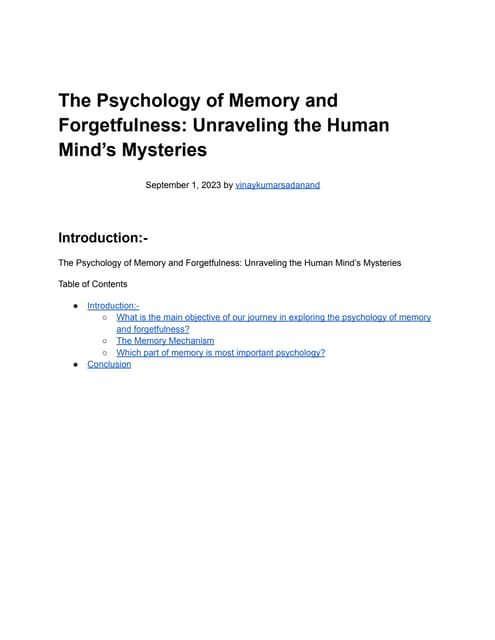



The Psychology of Memory and Forgetfulness: Unraveling the Human Mind’s Myste...civil hospital parasia
Ìý
Memory and forgetfulness are two enigmatic facets of the human mind that have fascinated scientists, psychologists, and philosophers for centuries. The intricate interplay between remembering and forgetting is a subject that transcends disciplines and holds profound implications for our daily lives. In this article, we embark on a journey to explore the fascinating psychology behind memory and forgetfulness, shedding light on the mechanisms that govern these cognitive processes.Forgetting intro 2009



Forgetting intro 2009hoja0602
Ìý
1. Forgetting can occur due to encoding failure, where information is not properly stored in long-term memory to begin with.
2. According to trace decay theory, stored memories naturally weaken over time unless they are refreshed through rehearsal. Early experiments found most memories were lost within 18 seconds without rehearsal.
3. Retrieval failure occurs when information is still stored but cannot be accessed, possibly due to interference from other memories. Providing memory cues can sometimes help with retrieval.Long_term_retention_recall



Long_term_retention_recallFrancisco Monteverde
Ìý
1. The document provides tips for improving long-term retention and recall of information. It discusses strategies for deep learning such as retrieval practice by self-quizzing, elaborative rehearsal by linking new information to existing knowledge, and the generation effect by creating your own study materials.
2. It explains how memories are formed and stored in the brain, moving from sensory memory to short-term and then long-term memory through consolidation. Forgetting occurs through memory decay if information is not retrieved and reinforced.
3. Surface or "shallow" learning strategies like repetition and flashcards are not as effective for long-term retention as deep learning strategies that involve retrieval practice, making meaningful connections, and generating yourPsychology Memory.docx



Psychology Memory.docxCharlesSsekawu
Ìý
1) The document discusses the key processes of memory: encoding, storage, and retrieval. It describes how information moves from sensory memory to short-term memory and then (through elaborative rehearsal) into long-term memory.
2) It then discusses several theories of forgetting, including decay, interference, retrieval-based forgetting, and storage-based forgetting. It also mentions motivated or purposeful forgetting, such as Freud's concept of repression.
3) The document questions how much we can truly intentionally forget or trust recovered memories of things like childhood trauma that were supposedly repressed.Forgetting Theory



Forgetting TheoryNur Haslinda Mohd Nazamri
Ìý
The document discusses four major theories of forgetting: decay theory, interference theory, motivated forgetting theory, and retrieval failure theory. It focuses on decay theory, which states that memories naturally fade over time without being accessed. Interference theory suggests that new memories can interfere with old ones, either when stored or retrieved. Motivated forgetting theory proposes that unpleasant or threatening memories may be purposefully forgotten.Memory 



Memory Col Mukteshwar Prasad
Ìý
The study of human memory has been a subject of science and philosophy for thousands of years and has become one of the major topics of interest within cognitive psychology.
But what exactly is memory? How are memories formed? The following overview offers a brief look at what memory is, how it works and how it is organized.MEMORY (1).pptx



MEMORY (1).pptxVandanaGaur15
Ìý
Memory refers to the psychological processes of acquiring, storing, retaining, and later retrieving information. Memory is the faculty of the mind by which data or information is encoded, stored ,and retrieved when needed.42-Article Text-207-1-10-20221213.pdf



42-Article Text-207-1-10-20221213.pdfNERRU
Ìý
The document discusses various models of human memory, including sensory memory, short-term memory, long-term memory, implicit memory, explicit memory, and flashbulb memory. It describes the encoding, storage, and retrieval processes of memory. Several factors that can affect memory are also discussed, such as age, emotions, stress, and physical/mental health. Different methods for studying memory are outlined, including learning, relearning, reconstruction, recognition, recall, and paired association methods.Psychology 1



Psychology 1juljuliemer
Ìý
Here are the key points about stress:
Definition of stress: Stress is the body's response to any demand placed on it. It is the body's reaction to a stressor or perceived threat, which can be either physical or psychological.
Sources of stress:
- Work/job demands - long hours, heavy workload, lack of control over work
- Financial problems - debt, low income, job insecurity
- Relationships - conflicts, lack of support, divorce, death of a loved one
- Health problems - chronic illness, disability, pain
- Life events - marriage, having children, moving house
- Daily hassles - traffic jams, long commutes, chores, errands
EffectsMemory



MemoryAlex Holub
Ìý
There are two main categories of learning: non-associative and associative. Memory involves information processing through sensory storage, short-term memory, and long-term memory. Forgetting can occur due to interference, where new memories block old ones, or due to memory decay over time as neuronal connections change. Factors like state dependency and context can also impact memory accuracy and recall.Memory and forgetting



Memory and forgettingAni Vadakke Purayil Kannur
Ìý
Memory involves three key processes - encoding, storing, and retrieving information. Encoding involves processing new information and converting it into a form that can be stored by the brain. Storage refers to how memories are held in the brain over time in sensory, short-term, and long-term memory. Retrieval is the process of accessing stored memories and bringing them into conscious thought. There are various factors that influence these memory processes such as attention, motivation, memory techniques, and the type and structure of the information being remembered.The Psychology of Memory and Forgetfulness: Unraveling the Human Mind’s Myste...



The Psychology of Memory and Forgetfulness: Unraveling the Human Mind’s Myste...civil hospital parasia
Ìý
Recently uploaded (20)
How to Configure Outgoing and Incoming mail servers in Odoo 18



How to Configure Outgoing and Incoming mail servers in Odoo 18Celine George
Ìý
Odoo 18 features a powerful email management system designed to streamline business communications directly within the platform. By setting up Outgoing Mail Servers, users can effortlessly send emails. Similarly, configuring Incoming Mail Servers enables Odoo to process incoming emails and generate records such as leads or helpdesk tickets. How to Manage Purchase Order Approval in Odoo 18



How to Manage Purchase Order Approval in Odoo 18Celine George
Ìý
In Odoo 18, you can set a minimum amount as a limit, and whenever an order comes above the limit, it requires the approval of the manager. In this slide, we are diving into the crucial aspect of procurement, which is managing purchase order approval. 3. AI Trust Layer, Governance – Explainability, Security & Compliance.pdf



3. AI Trust Layer, Governance – Explainability, Security & Compliance.pdfMukesh Kala
Ìý
AI Trust Layer, Governance – Explainability, Security & Compliance20250402 ACCA TeamScienceAIEra 20250402 v10.pptx



20250402 ACCA TeamScienceAIEra 20250402 v10.pptxhome
Ìý
Team Science in the AI Era: Talk for the Association of Cancer Center Administrators (ACCA) Team Science Network (April 2, 2025, 3pm ET)
Host: Jill Slack-Davis (https://www.linkedin.com/in/jill-slack-davis-56024514/)
20250402 Team Science in the AI Era
These slides: TBD
Jim Twin V1 (English video - Heygen) - https://youtu.be/T4S0uZp1SHw
Jim Twin V1 (French video - Heygen) - https://youtu.be/02hCGRJnCoc
Jim Twin (Chat) Tmpt.me Platform – https://tmpt.app/@jimtwin
Jim Twin (English video – OpenSource) – https://youtu.be/mwnZjTNegXE
Jim Blog Post - https://service-science.info/archives/6612
Jim EIT Article (Real Jim) - https://www.eitdigital.eu/newsroom/grow-digital-insights/personal-ai-digital-twins-the-future-of-human-interaction/
Jim EIT Talk (Real Jim) - https://youtu.be/_1X6bRfOqc4
Reid Hoffman (English video) - https://youtu.be/rgD2gmwCS10Introduction to Systematic Reviews - Prof Ejaz Khan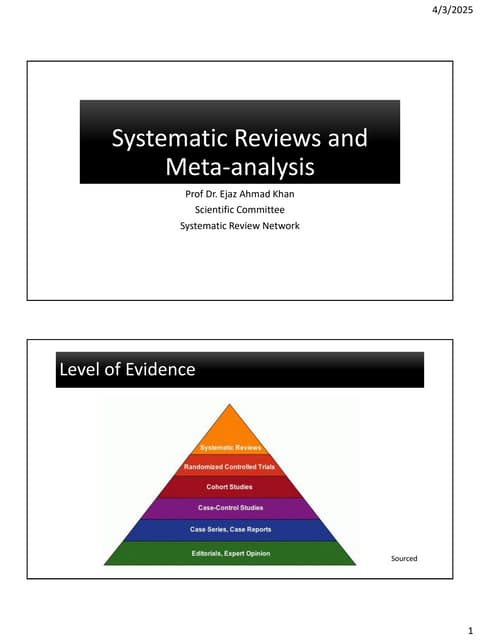



Introduction to Systematic Reviews - Prof Ejaz KhanSystematic Reviews Network (SRN)
Ìý
A Systematic Review:
Provides a clear and transparent process
• Facilitates efficient integration of information for rational decision
making
• Demonstrates where the effects of health care are consistent and
where they do vary
• Minimizes bias (systematic errors) and reduce chance effects
• Can be readily updated, as needed.
• Meta-analysis can provide more precise estimates than individual
studies
• Allows decisions based on evidence , whole of it and not partialKey Frameworks in Systematic Reviews - Dr Reginald Quansah



Key Frameworks in Systematic Reviews - Dr Reginald QuansahSystematic Reviews Network (SRN)
Ìý
Recognize features of systematic reviews and meta-analyses as a research design
Identify the elements of a well-defined review question
Understand and develop search strategies and able to turn research questions into search strategy
Perform a comprehensive search for relevant studies
Manage the results of systematic searches
Extract data and assess risk of bias of included studies
Understand and carry out quantitative analysis of extracted data
Apply the methodology and conduct reviews independentlyMICROECONOMICS: RENT AND THEORIES OF RENT



MICROECONOMICS: RENT AND THEORIES OF RENTDrSundariD
Ìý
CONCEPTS COVERED: RENT, THEORIES OF RENT, QUASI RENTUnit1 Inroduction to Internal Combustion Engines



Unit1 Inroduction to Internal Combustion EnginesNileshKumbhar21
Ìý
Introduction of I. C. Engines, Types of engine, working of engine, Nomenclature of engine, Otto cycle, Diesel cycle Fuel air cycles Characteristics of fuel - air mixtures Actual cycles, Valve timing diagram for high and low speed engine, Port timing diagramKarin Clavel - Collection Wall: Inspiring connection and collaboration



Karin Clavel - Collection Wall: Inspiring connection and collaborationvoginip
Ìý
Lezing bij VOGIN-IP-lezing 2025, OBA AmsterdamU.S. Department of Education certification



U.S. Department of Education certificationMebane Rash
Ìý
Request to certify compliance with civil rights lawsGeneral Quiz at Maharaja Agrasen College | Amlan Sarkar | Prelims with Answer...



General Quiz at Maharaja Agrasen College | Amlan Sarkar | Prelims with Answer...Amlan Sarkar
Ìý
Prelims (with answers) + Finals of a general quiz originally conducted on 13th November, 2024.
Part of The Maharaja Quiz - the Annual Quiz Fest of Maharaja Agrasen College, University of Delhi.
Feedback welcome at amlansarkr@gmail.comGold Spot Dairy Store Jordan Minnesota 55352



Gold Spot Dairy Store Jordan Minnesota 55352Forklift Trucks in Minnesota
Ìý
Information about the Gold Spot in Jordan. From what looks like it's beginning right to it's end. What's lacking is photos.Knownsense 2025 prelims- U-25 General Quiz.pdf



Knownsense 2025 prelims- U-25 General Quiz.pdfPragya - UEM Kolkata Quiz Club
Ìý
General College Quiz conducted by Pragya the Official Quiz Club of the University of Engineering and Management Kolkata in collaboration with Ecstasia the official cultural fest of the University of Engineering and Management Kolkata.Anti-Fungal Agents.pptx Medicinal Chemistry III B. Pharm Sem VI



Anti-Fungal Agents.pptx Medicinal Chemistry III B. Pharm Sem VISamruddhi Khonde
Ìý
UNIT – IV
Antifungal agents:
Antifungal antibiotics: Amphotericin-B, Nystatin, Natamycin, Griseofulvin.
Synthetic Antifungal agents: Clotrimazole, Econazole, Butoconazole,
Oxiconazole Tioconozole, Miconazole*, Ketoconazole, Terconazole,
Itraconazole, Fluconazole, Naftifine hydrochloride, Tolnaftate*Yale VMOC Special Report - Measles Outbreak Southwest US 3-30-2025 FINAL v2...



Yale VMOC Special Report - Measles Outbreak Southwest US 3-30-2025 FINAL v2...Yale School of Public Health - The Virtual Medical Operations Center (VMOC)
Ìý
Measles Outbreak—Southwestern US— This briefing reviews the current situation surrounding the measles outbreaks in Texas, New Mexico, Oklahoma, and Kansas. EDL 290F Week 5 - Facing Headwinds and Hairpin Turns (2025).pdf



EDL 290F Week 5 - Facing Headwinds and Hairpin Turns (2025).pdfLiz Walsh-Trevino
Ìý
EDL 290F Week 5 - Facing Headwinds and Hairpin Turns (2025).pdfYale VMOC Special Report - Measles Outbreak Southwest US 3-30-2025 FINAL v2...



Yale VMOC Special Report - Measles Outbreak Southwest US 3-30-2025 FINAL v2...Yale School of Public Health - The Virtual Medical Operations Center (VMOC)
Ìý
Forgetting and theories of forgetting
- 3. Forgetting refers to the inability to retrieve previously stored information. When you forget something it means that it is unavailable to you at the time you are trying to remember it, not that it is gone forever. The information may be stored in your memory but for some reason you cannot retrieve it when you want to. Forgetting is supposed to occur when the information in LTM decays due to passage of time or due to interference from other material or due to the time elapsed
- 4. A forgetting curve shows the pattern (rate and amount) of forgetting that occurs over time. Generally this curve shows that forgetting is rapid at first, then the rate of memory loss gradually declines as time passes. More than half of the memory loss occurs within the first hour after learning.
- 5. You can see that over half of what is learnt is forgotten in the first hour Most of what we forget (about 65% ) is lost in the first 8 hours
- 6. Psychologists have developed a number of theories to explain why we forget. Forgetting may occur because: The right retrieval cue is not used. There is interference from competing material. There is some underlying motivation not to remember. Memory fades through disuse.
- 7. Retrieval Failure Theory refers to when we forget because we lack or fail to use the right cues or prompts to retrieve what is stored in our memory. This theory is often referred to as cue-dependent forgetting and is a useful explanation of why we sometimes fail to retrieve information even when we’re sure we know the information.
- 8. Retrieval failure is where the information is in long term memory, but cannot be accessed. Such information is said to be available (i.e. it is still stored) but not accessible (i.e. it cannot be retrieved). It cannot be accessed because the retrieval cues are not present. When we store a new memory we also store information about the situation and these are known as retrieval cues. When we come into the same situation again, these retrieval cues can trigger the memory of the situation. Retrieval cues can be: External / Context - in the environment, e.g. smell, place etc. Internal / State- inside of us, e.g. physical, emotional, mood, drunk etc.
- 9. Have you ever tried to recall a fact – perhaps the name of an actor in a movie – that you’re sure you know and feel just on the verge of remembering? You know that you know the answer but can not quite bring it forth. Psychologists call this the tip-of-the-tongue phenomenon.
- 10. Tip-of-the-tongue (TOT) is a state, or ‘feeling’, that occurs when individuals are aware of knowing something, confident they will eventually remember it, but aren’t able to retrieve it from memory at that point in time. When the sought after information is recalled, its recall tends to occur suddenly, often seeming to ‘pop’ out of memory.
- 11. The apparent gap in memory which occurs in a TOT state is particularly intriguing because even though we can’t say the word, we have some information about the word we want; For example we can often tell how many syllables it has, the beginning and ending letters, or what it rhymes with. We can also eliminate words that don’t sound right or are incorrect.
- 12. These observations suggest that TOT involves a partial retrieval process in which bits of information can act as retrieval cues for the required information, helping to ‘home in’ on this information. Furthermore, the observation that specific bits or types of information assist in retrieval indicates information in LTM is stored in an organised way and in a variety of forms.
- 13. The TOT phenomenon is significant because it illustrates several aspects of the retrieval process. First it shows that retrieving is not an all-or-nothing process. Second, information is stored in LTM but it is not accessible without retrieval cues. Third, TOT experiences indicate that information stored in LTM is organised and connected in relatively logical ways.
- 14. Decay theory is based on an assumption that when something new is learned, a physical change or chemical trace of the experience which contains the stored information is formed in the brain. This is called memory trace and is believed to gradually fade or disintegrate as time passes unless it is reactivated by being used again.
- 16. Trace decay theory explains memories that are stored in both short term and long term memory system. According to this theory, short term memory (STM) can only retain information for a limited amount of time, around 15 to 30 seconds unless it is rehearsed. If it is not rehearsed, the information will start to gradually fade away and decay. Donald Heb proposed that incoming information causes a series of neurons to create a neurological memory trace in the brain which would result in change in the morphological and/or chemical changes in the brain and would fade with time. Repeated firing causes a structural change in the synapses. Rehearsal of repeated firing maintains the memory in STM until a structural change is made.
- 17. Therefore, forgetting happens as a result of automatic fading of the memory trace in brain. This theory states that the events between learning and recall have no effects on recall; the important factor that affects is the duration that the information has been retained. Hence, as longer time passes more of traces are subject to decay and as a result the information is forgotten. One major problem about this theory is that in real-life situation, the time between encoding a piece of information and recalling it, is going to be filled with all different kinds of events that might happen to the individual. Therefore, it is difficult to conclude that forgetting is a result of only the time duration.
- 18. . Decay theory suggest that we forget something because the memory of it fades with time. This theory would suggest that if we do not attempt to recall an event, the greater the time since the event the more likely we would be to forget the event. Thus, this theory suggests that memories are not permanent. There are other theories of forgetting. Memory for an event may reflect interference. The interference theory of forgetting suggest that we would forget something because other information learned is interfering with our ability to recall it.
- 19. One problem with the decay theory of forgetting is that we do not know whether the failure to recall something reflects that it is no longer in our memory, or that it reflects retrieval failure. Perhaps it is still there but we cannot retrieve the memory for some reason.
- 20. 1) Shape of the forgetting curve is greatly influenced by the activities during the retention interval. 2) The logarithmic function does not hold for autobiographical memories. 3) Therefore, there is little evidence that decay is the primary cause of loss of information from long-term memory.
- 21. Four different explanations: decay: minimal role in LTS forgetting consolidation: disruption occurs under special circumstances interference theory: explains some forgetting, but the mechanisms need work retrieval failure: richest, most complete explanation, but may be circular.






